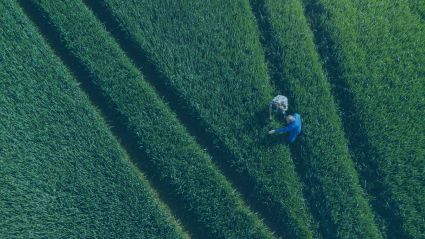
As executive director of the World Food Programme, I saw firsthand destitute hunger causing pain and suffering in communities around the world. Every year, victims of climate change face the consequences of drought-driven poor agricultural yields, spiraling civil unrest, and indefatigable hunger. I applaud the continued noble and necessary work bringing humanitarian assistance to victims of natural and man-made disasters resulting from accelerated climate change. But we need to create a world where people do not rely on these cyclical responses for survival.
Today’s food system is failing. As a result, underserved communities are disproportionately affected by hunger, undernutrition, and diet-related chronic disease. Demographic and demand shifts, as well as fragile supply chains, are stressing the system’s resilience and adaptive capacity. Climate change hampers food production and supply chains, impacting universal access to a diverse, healthy diet. Health care focuses on “sick care” rather than addressing the social and nutritional determinants of poor health. The private sector has saturated the food environment with calorie-dense, nutrient-poor, ultra-processed foods that are highly available, affordable, and desirable. As a result of these failures, the inequitable triple burden of malnutrition is growing.
Research and experience confirm that an equitable food system is driven by resilient enterprises.
Reactionary solutions are insufficient for solving the food and malnutrition crisis. Of course, philanthropic and government programs must support an adequate social safety net and deploy humanitarian assistance. Yet research and experience confirm that a just, sustainable food system capable of addressing our environmental and health challenges is driven by resilient, market-driven enterprises—from farm to fork.
Private asset managers and owners who are passionate about creating a healthier, equitable, and regenerative food system have an opportunity to achieve those goals by investing capital and technical support into innovative food and agriculture enterprises, particularly those led by historically overlooked, talented entrepreneurs.
To this end, I founded Food Systems for the Future (FSF) to invest capital through our Good Food Opportunity Fund. Entrepreneurs deliver measurable nutrition impact and a market-rate return. FSF works with partners, including governments, creating the enabling ecosystem and providing direct technical support to improve nutrition security, particularly in underserved US and sub-Saharan Africa communities. FSF has developed science-backed metrics to quantify how business strategies and operations directly improve accessibility, affordability, and awareness of nutritious food—enabling entrepreneurs and investors alike to identify, monitor, evaluate, and communicate their population nutrition impact.
For example, in response to chronically high child stunting rates in Rwanda, FSF is investing in a solution that increases the affordability, accessibility, and consumption of animal protein. Alongside Rwanda’s Ministry of Agriculture, we are building Africa’s first automated black soldier fly larvae insect-protein facility to reduce reliance on expensive feed inputs, animal feed costs, and egg costs, and thereby increase the availability of nutrient-dense, animal-source foods. Value-chain approaches focusing on scaling multi-stage innovative companies that sustainably deliver affordable, nutritious food are critical to centering equity in private financing. Rigorous nutrition-impact assessment of business operations and strategies, continued monitoring, evaluating, and reporting on the nutritional impacts of this approach will provide validation to catalyze future private and public investments in such programs.
Other promising, innovative, farm-to-fork models building regenerative, integrated, resilient food systems for underserved communities exist. For example, Tufts Friedman School of Nutrition Science and Policy, Tougaloo College, Delta Health Center, and the Center for Science in the Public Interest are collaborating to develop the first-of-its-kind, community-based Food is Medicine model in three Mississippi Delta counties where 65 percent of residents identify as Black, 30 percent live at or below poverty, and nearly one in two people suffer from obesity. The collaboration’s approach aims to increase economic opportunities for local farmers to grow fresh food that directly feeds into the Delta Health Center’s produce prescription program and is delivered to at-risk residents. This holistic program will regularly measure anthropometric indicators, blood glucose levels, and dietary quality to identify its impact on improving health outcomes and reducing health disparities.
While these projects are distinct, they share two major themes. First, both projects aim to build regenerative, resilient systems that address inefficiencies in the supply chain; equitably uplift stakeholders across the value chain; and increase access to affordable, nutritious foods. Second, both prioritize collection of crucial data to evaluate the impact of such operations/interventions on the nutrition of underserved communities and help inform future scientific solutions for our broken, inequitable food system.
To make nutritious food sustainably affordable and available for all people on this planet, we need to do better than putting Band-Aids on problems. Adequately financed market-based, holistic solutions—coupled with rigorous nutrition-impact data collection and reporting—are the engine for a healthier, more equitable food system.





















